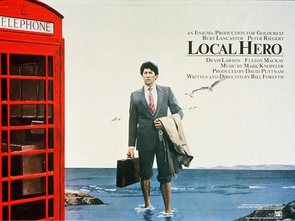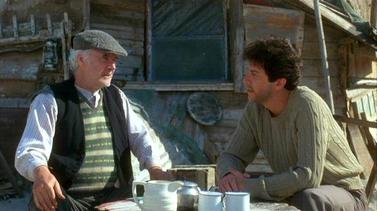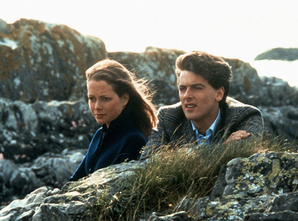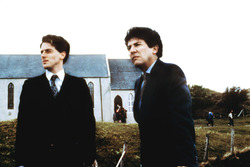
by Graham Osborne
Local Hero is a fantastic movie. Made in 1983, by Bill Forsyth, it is a wonderful, lighthearted comedy about a small Scottish village and the big oil company that wants to buy it.
Local Hero is a fantastic movie. Made in 1983, by Bill Forsyth, it is a wonderful, lighthearted comedy about a small Scottish village and the big oil company that wants to buy it.

The story focuses on Mac Macintyre (played by Peter Riegert) as a salesman from Knox Oil and Gas who gets sent to the remote Scottish village of Ferness to purchase the land and turn it into an Oil Refinery, and his interactions with the, slightly, eccentric locals. The film also displays some fantastic turns from actors such as Burt Lancaster as Happer (the head of Knox Oil and Gas), Denis Lawson as Urquhart (Hotelier, Accountant/Lawyer and sometimes a cab driver), and Peter Capaldi as Oldsen (another employee of Knox).
A lot of the comedy in the film comes from the clear juxtaposition between the quiet village life and Mac’s hectic lifestyle. As the film progresses we see Mac change as he grows to understand village life, whilst trying to negotiate the sale of the property with Urquhart. Happer’s character is also a very different style of CEO, coming across as a caring, almost father-like figure to Mac, his love of the night sky is also one of the reasons we see Mac grow as a person. not clearly explained - what is the relevance of this example?
The film manages to avoid the traditional “corrupt business against the locals” tropes by having both sides willing to sell the land, with the majority of the film taken up with the negotiations, whilst other side-plots focus on Oldsen’s attempts to woo a marine biologist, and Happer’s dealings with an abusive therapist. The sub-plots happily flesh out the tone of the film, but ultimately don’t contribute greatly to the main plot until the very end - possibly the main failing with the film. The story involving Happer’s therapist being especially at odds with the rest of the film, and having ultimately no real payoff.
A lot of the comedy in the film comes from the clear juxtaposition between the quiet village life and Mac’s hectic lifestyle. As the film progresses we see Mac change as he grows to understand village life, whilst trying to negotiate the sale of the property with Urquhart. Happer’s character is also a very different style of CEO, coming across as a caring, almost father-like figure to Mac, his love of the night sky is also one of the reasons we see Mac grow as a person. not clearly explained - what is the relevance of this example?
The film manages to avoid the traditional “corrupt business against the locals” tropes by having both sides willing to sell the land, with the majority of the film taken up with the negotiations, whilst other side-plots focus on Oldsen’s attempts to woo a marine biologist, and Happer’s dealings with an abusive therapist. The sub-plots happily flesh out the tone of the film, but ultimately don’t contribute greatly to the main plot until the very end - possibly the main failing with the film. The story involving Happer’s therapist being especially at odds with the rest of the film, and having ultimately no real payoff.

Capaldi’s portrayal of Oldsen is enjoyable to watch, especially when compared to his later works as the foul-mouthed Tucker from The Thick of It, and his the rumours of how he has chosen to portray The Doctor portrayal of the Doctor. (In case you’re wondering, no, this is not a coincidence that we are discussing a film with Peter Capaldi in on the day Doctor Who returns with him in the star role). Oldsen’s infatuation with an attractive Marine Biologist and his attempts to get to know her are almost childlike in their exuberance, and this, combined with his rather comical way of running and attempts to act covertly at the airport makes for a brilliant comic character.
Maintaining the theme of not following stereotypes, the introduction of Russian fisherman Victor midway through the film gives a very different portrayal of Russians during Cold War times than other films (Red Dawn was released a year later) Whilst the Russians in the latter are all of the “diehard communist” variety, Victor comes across as a well loved visitor to the community and (like many other Russians at the time) always looking for a way to make some quick cash. His arrival is deemed cause for celebration, and sees him singing a song about life on the American prairie.
Maintaining the theme of not following stereotypes, the introduction of Russian fisherman Victor midway through the film gives a very different portrayal of Russians during Cold War times than other films (Red Dawn was released a year later) Whilst the Russians in the latter are all of the “diehard communist” variety, Victor comes across as a well loved visitor to the community and (like many other Russians at the time) always looking for a way to make some quick cash. His arrival is deemed cause for celebration, and sees him singing a song about life on the American prairie.

Whilst we’re on the subject of music, the soundtrack to the film is by Mark Knopfler (Dire Straits), marking the first time he’d written music for a film, though he went on to write for other films, including The Princess Bride. Variations on the song Going Home are heard throughout the film with the credits receiving the final version in all its glory, bagpipes included. The soundtrack managed to do even better than the film itself, receiving a BAFTA nomination for Best Score for a Film.
Local Hero is a timeless classic, there is so much to enjoy about the film that makes repeated viewings almost a necessity. The ending is incredibly poignant, and the locales for shooting are beautifully idyllic.
Local Hero is a timeless classic, there is so much to enjoy about the film that makes repeated viewings almost a necessity. The ending is incredibly poignant, and the locales for shooting are beautifully idyllic.

 RSS Feed
RSS Feed
